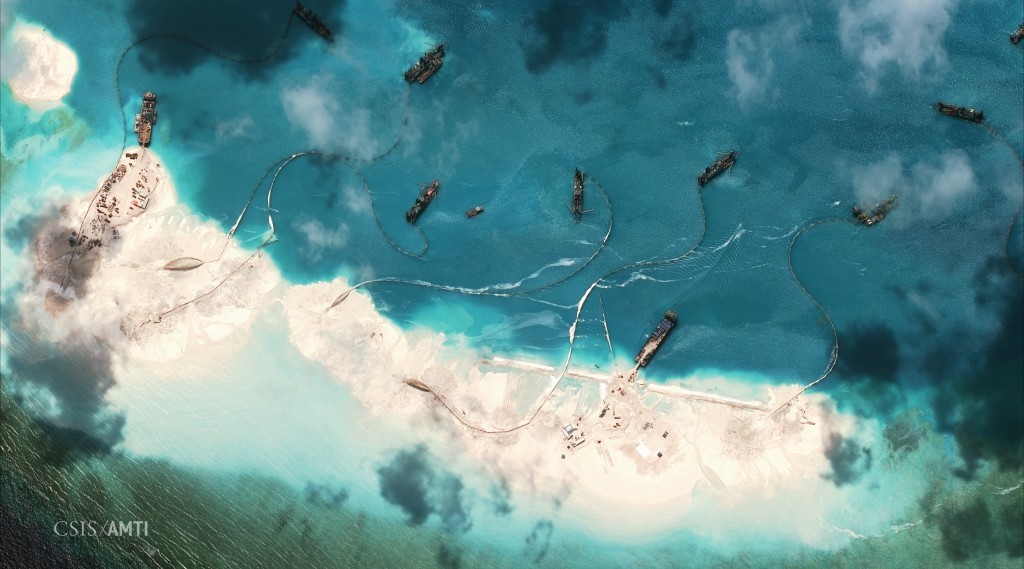
THE reclamation activities of China in Panganiban (Mischief) Reef, an area within the Philippines’ exclusive economic zone in the disputed West Philippine Sea (South China Sea), progressed just in a few months in 2015, as shown in satellite images.
MANILA — If a nation does not respect our boundaries, how can we trust them as potential partners in joint development?
A non-profit organization specializing in defense gave such caution to the Duterte administration as government planned its next steps after the Philippines won its arbitration bid against China, successfully convincing the United Nations arbitral tribunal to invalidate Beijing’s sweeping nine-dash line claim over the South China Sea.
Trident Defense chair Rodrigo Mejia urged the government Tuesday night to refrain from engaging in talks with China in the wake of the UN ruling, commenting on the new administration’s openness to hold talks with its constantly encroaching neighbor.
“We may be a small country, but we are a nation of warriors. So let’s show them, no talk to the Chinese for one year or two years. Freeze muna. Show them the we are also resolute,” Mejia said in a press briefing Tuesday night.
Mejia said we should “teach them [China] a lesson. We should also be tough.”
Lawyer Toby Purisima, Trident Defense president, said the Philippines should instead take advantage of the ruling to show China what we are made of as a nation.
“We’re the victors here. We should exploit this ruling to our favor. We should allow joint development, whether there is a ruling or not. I’m not saying we should fight. But we shouldn’t be too welcoming because maybe we also have pride as a nation, and we have something to fight for,” he said.
The UN arbitration panel ruled on Tuesday that China may not assert historical claims to almost all of the South China Sea, as provisions of the United Nations Convention on the Law of the Sea (Unclos), which delineated exclusive economic zones (EEZ) for respective countries, had superseded the effect of such claim.
China is a signatory to the international treaty but refused to take part in legal proceedings at the Permanent Court of Arbitration at The Hague, in which the Philippines invoked remedies available under the Unclos to stop Beijing’s encroachments into its EEZ. As expected, Beijing rejected the ruling.
Purisima said the previous administration did not resort to arbitration for nothing, as the legal action was a final resort when years of negotiations had failed.
“We should not consider joint development activities with China since that would require recognition of China’s claims in the South China Sea and admission of China’s indisputable sovereignty rhetoric,” Purisima said.
“What makes us think that an encroaching neighbor that failed to honor its treaty obligation and the processes under Unclos would honor any joint development activity with the Philippines?,” he said.
He said the Philippines should be doubtful “if we can count on [China] to be a square partner in joint development.”
Mejia said the Philippines should work on strengthening its defense alliances in the region, saying China may be expected to save face and take drastic action in retaliation for the ruling.
“We should not be euphoric yet. This is just the beginning. We have to brace ourselves for a bigger battle,” Mejia said.
At the Philippine Congress, incoming Senate President Aquilino Pimentel III said the ruling upheld “our power of control over the areas and the West Philippine Sea falling under our EEZ (exclusive economic zone) as provided for in the UNCLOS.”
“We call on China and other States to respect such a reasonable and objective ruling,” Pimentel said in a text message.
He said the government should now “find ways to peacefully assert ths power of control immediately for the benefit of our fishermen and in the long term for the benefit of future generations of Filipinos who may discover the yet unknown riches of ths EEZ.” (With a report from Christine O. Avendaño) SFM
RELATED VIDEOS